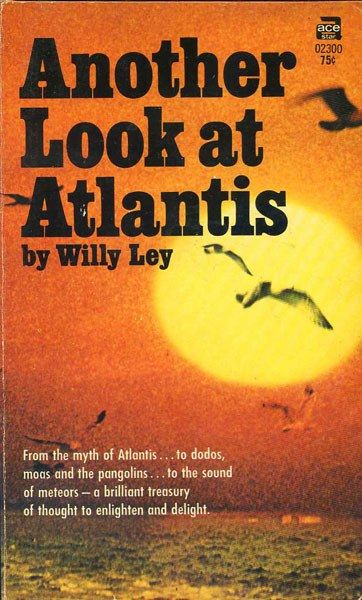The Bright Blessed Day
Another Look at Atlantis and Fifteen Other Essays
By Willy Ley

7 Jan, 2018
Willy Ley’s 1969 Another Look at Atlantis and Fifteen Other Essays is a collection of non-fiction pieces. From 1952 to his death in 1969, Ley had a regular science column in Galaxy Magazine, For Your Information. As far as I can tell, none of these essays were drawn from that source.
This was my first exposure to Ley. If I am reading the bibliographic information correctly, it was the final Ley book published while Ley was alive.
Introduction (Another Look at Atlantis and Fifteen Other Essays) • essay by Lester del Rey
Self-explanatory.
Comment
It’s clear from del Rey’s essay that the Ley he writes about is a well-known science popularizer. Sic transit gloria mundi.
Another Look at Atlantis
A discussion about Atlantis roams from what is known (not much), what various people convinced themselves could be true on rather slender grounds (rather a lot), and finally, the very interesting archaeological results from the Mediterranean island Santorini, whose volcanic destruction appears to coincide with the end of the Minoan culture.
Comments
I am fairly certain this essay played a role in the genesis of Poul Anderson’s 1971 The Dancer from Atlantis.
The Wreck of La Lutine
Ley recounts the 1799 loss of the gold-filled ship La Lutine, and the recovery attempts that followed.
Comments
As far as I can tell, most of the gold is still buried at the bottom of the sea near the West Frisian Islands.
The Great Pyramid, the Golden Section and Pi
What secrets of the universe do people think are encoded in the great Pyramid? What secrets does Ley think are encoded in the Great Pyramid?
Comments
The Egyptians were discourteous enough to leave records relating to their construction methods and Ley rather unkindly has read them, which means his interpretation is based on grim fact and not beautiful fantasies.
Who Invented the Crossbow?
A brief history of the crossbow.
Comments
One that completely omits Asian crossbows.
Dead or Alive?
Ley recounts the history of the study of ground sloths before considering the question of whether or not any are still alive.
Comments
Answer unclear. Ask again later.
A Century of New Animals
What it says on the tin.
Largest of Their Kind
A discussion of the largest animals known to science, a surprising fraction of which are modern.
Comments
Just as the Sun is a larger than average star, humans are one of the bigger species around.
A Pangolin is a Pangolin
Pangolins: awesome and very, very weird, mammals with scales like lizards, and teeth in their stomach.
Comments
I have this essay to thank for alerting me to the existence of pangolins.
Hunting the Dodo
A short, sad history of a bird most famous for having gone extinct.
Other Islands, Other Dodos
A short, sad history of the relatives of birds most famous for having gone extinct. They fared little better than their most famous kin.
The Last of the Moas
An account of what was known about the moa (flightless birds native to New Zealand), ending with an intriguing account of one from the late 1800s.
Comments
Moa research has marched on since Ley’s time. Pity he didn’t see it.
The moa seem very sincerely extinct but because there are relatively recent remains, might be a candidate for cloning and such. This will surely not end with humanity consumed down to the last infant by large, angry, flightless birds.
Let’s Build an Extraterrestrial!
Self-explanatory and rather disappointing. Seem to be pre-Mariner, judging by its antique ideas about Venus.
The Laws of Utter Chaos
A short account of the scientific study of gas, beginning with the dawning comprehension that gas was a thing that could be studied.
The Sound of the Meteors
What sort of noises do meteors produce, where, and why?
Who’ll Own the Planets?
Self-explanatory and thanks to the march of treaty agreements, quite obsolete.
Death of the Sun
One part the history of what was known about stellar evolution to one part an account of what was believed to be true in 1969.
Comments
This is further evidence that many Golden Age SF authors were well out of touch with current astronomical research.
The Re-Designed Solar System
A short account of the delights revealed by humanity’s space probes, said delights being the realization of just how hostile to human life the other planets are.
General comments
Ley was a friend of von Braun’s. Unlike von Braun, Ley did not cut a deal with the Nazis but escaped to America. In his day, he was a fairly well known science popularizer. Nearly a half century after Ley’s death, he is no longer a well known figure; if one were to button hole a stranger and ask them about Ley and Bonestell’s International Fantasy Award winner, 1949’s The Conquest of Space, I expect all you would get is a blank look.
It’s a pity because aside from the shocking lack of an index, this is a perfectly charming collection of short, informative popular science essays. Where convenient, Ley explains his research methods, something that would allow the teenagers at whom this book was aimed to emulate him. In many cases, science has moved on, as it does, but I am sure Ley would be delighted by the new information1. Although contemporaries mention a German accent there’s no hint in his style that English is not his mother tongue2.
This is long, long out of print and your library probably does not have a copy. Pity. Used bookstores are your only recourse in this matter.
1: He is somewhat put out by the hellworlds Mars and Venus turned out to be but if he’d only lived a decade or so longer, he would have seen the first hints that worlds like Europa were not mere dead rocks.
2: He spoke German, Russian, English, and French.
